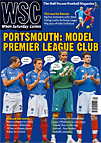 More football coverage doesn't necesarily mean any more information. Paul Ramon vents on a pet hate
More football coverage doesn't necesarily mean any more information. Paul Ramon vents on a pet hate
Jerry Seinfeld has a joke on how it is amazing that the amount of news that happens every day always just exactly fits the newspaper. Suffice to say he doesn’t read the sport sections of the British press. While in the past decade or so the sport pages have multiplied, often even into their own pullout sections, the amount of news has unsurprisingly refused to follow suit. This leaves each day’s few notable events padded out by stories as irrelevant and disposable as an unofficial biography of a teenage pop star.
Central to this space-filling practice is the “quotes piece”, a story based around an almost always wholly uninteresting quote dressed up as if it has huge relevance. As I write I can see on the Times website that Tim Howard says the USA will “fight to the end” against England in the World Cup, while Jack Rodwell is confident that Everton can qualify for Europe. Elsewhere the Guardian are making much of John Terry saying that the England dressing room isn’t divided.
For a moment think about what each of these players has actually said – would any of them have said anything else on these subjects? Was Howard really going to say that the USA will throw in the towel if they are trailing after 70 minutes? Would Terry say “yes, I have split the England dressing room”? It is the emperor’s new clothes – if you say it is a news story perhaps no one will point out that there is nothing there.
The practice becomes clear if you take away the story cobbled around the quotes and just read them in isolation. The Guardian website recently gave prominence to a story based entirely on the following quote about the Europa League from Steven Gerrard: “The teams knocked out of the Champions League are fantastic and some of the top sides across Europe are in the competition so it’s going to be tough to win it but we can go all the way.” If they think that this is news then they should watch Match of the Day, they’ll get a good month’s worth of copy from every interview.
Admittedly the Gerrard story was so thin that it didn’t make it into the paper. But it shows how, due to the increasingly tough battle for hits, newspapers’ websites have become worse offenders than the papers for needless quotes pieces. No one yet has any idea how to create profit from internet news websites, but there is a hunch it will turn out to be something to do with “traffic” – the number of people visiting the site. The simplest way to increase this is to have more and more stories. It doesn’t matter if people think the story is rubbish, once they have clicked on it, it becomes another statistic to show the advertisers. Unlike with papers who need to build a loyal readership, a large proportion of hits come from people simply surfing about for news on Google. So get the stories up and get the hits.
On top of this there is the perception that these days football fans want constant rolling news, that it is no longer a sport but a soap opera that we can’t resist tuning in to every hour of every day; the difference being that when a soap opera like Eastenders expands from two to four episodes a week they can create more characters and plotlines to fill the extra screentime. If anything football has reduced its pool of characters to those from just a few select big clubs, while the plotlines have got less dramatic as each club and player becomes micro-managed by press officers and media training.
Between games there is actually very little going on, even more so since the introduction of the transfer window. So instead we now have concepts like managerial “mind games”, almost always based on quotes gleaned from press conferences the managers or players are obliged to attend and which journalists turn up at having already been given a space to fill. This leads to minor events being blown out of proportion or the creation of long sagas over innocuous incidents – witness the recent running story over Shaun Wright-Phillips’s wages at Man City.
Coverage of football is becoming sanitised at almost every turn, from anodyne TV punditry by players’ golfing chums to interviews given on the proviso that the subject will be pictured head to toe in Adidas. At the same time – as Notts County, Portsmouth and Man Utd fans will tell you – football is more in need of challenging, investigative journalism than ever before. For this reason alone fans should not be happy to read a sport section made up of stories about famous players saying nothing about very little. Find a story or, to paraphrase my mum, if you’ve got nothing interesting to report then don’t report anything at all.
From WSC 278 April 2010